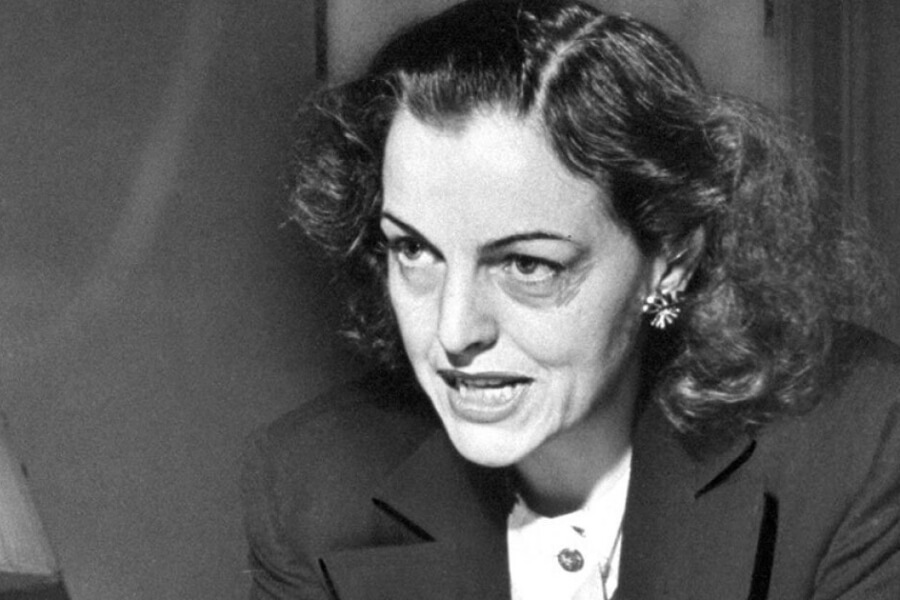This month we are “celebrating” two big 50-year anniversaries. One—not so happy but scarily relevant—is the Watergate break-in. The other—worth remembering and saluting—is the founding of Ms. Magazine.
One woman–who very few still remember, especially outside of California—played a role of sorts in both those events. Her name was Helen Gahagan Douglas, one of my life heroines.
The New York Times called her “still young looking” at age 50. Imagine!
In 1950, Richard Nixon, then a 38-year-old first-term Congressman from that state, high on red-baiting, ran for the United State Senate. His opponent was a 50-year-old (“but still young looking,” according to the New York Times) three-term congresswoman. Yep, Ms. Douglas.
Their race broke all previous records for spending (on his side) and vitriol (almost all on his too). This, after all, was where Nixon first earned his moniker “Tricky Dick,” in honor of his countless shenanigans (tossing her leaflets into the Pacific, calling off her rallies) and the dirt he threw at the elegant Ms. Douglas.
“She’s pink right down to her underwear,” he denounced. That comment, his use of pink paper in a flyer about her record, conspired to land her an undesirable moniker of her own: The Pink Lady.
Read More: An Insider’s Perspective on Ms. Magazine’s 50th Anniversary
The Loser Wins
Although their contest appeared to be close until the very end, she never had a chance. Her own husband, the great actor Melvyn Douglas, had warned her that the time was wrong. “China is Communist, the Soviets have the bomb. The Republicans will be playing on our fears,” he said. But Helen, who had never really faced defeat in her life, jumped in. Nixon won handily and the rest is regrets only.
“I always remembered my parents talking about Helen Gahagan Douglas and what Nixon did to her,” says Robert Redford.
“I always remembered my parents talking about Helen Gahagan Douglas and what Nixon did to her,” Robert Redford told me. “I think it was my earliest lesson in politics.”
I had the great privilege of interviewing this remarkable woman in 1973. It was the height of Watergate and the press tried to get the 73-year-old Douglas, still an activist but now in private life, to exhibit some sense of vindication. She would have none of it. “I feel only sadness for this country and that he has lowered the bar for campaigns,” she said.
The Making of a Force of Nature
Helen was not your straight-from-the-crate liberal. She grew up a rather entitled drama queen in a Republican mansion in Brooklyn. Against her intimidating father’s orders, she quit Barnard to pursue her dream of acting. At 21, she starred in her first Broadway play and Heywood Hale Broun famously described her as, “eight of the ten most beautiful women in the world.”
Her political epiphany came during a family driving trip across the country when she first witnessed thousands of migrant workers traveling in destitution.
Always seeking new challenges, she tackled opera in her late twenties and became an international singing star. But her first major life change came when she starred opposite a newcomer named Melvyn Douglas in a David Belasco play called Tonight or Never. Not only did they fall in love and soon after marry but his political activism as a New Deal Democrat slowly started to gnaw away at her privileged indifference.
They moved to Hollywood where he became a movie star and she starred in one bomb, the forgettable She. They had two children, and Helen started paying attention to FDR’s radio addresses. Her real political epiphany came during a family driving trip across the country when she first witnessed thousands of migrant workers traveling in destitution.
After that, she organized the state’s Steinbeck Committee to help the migrants; she and Melvyn became close friends of the Roosevelts (oh yes, she switched parties); she became Chairman of the Democratic Women’s Division; Melvyn went to war; Helen ran for Congress and won.
The press had a field day with the beauteous new Representative. Reporters tried to create a catfight between Helen and her GOP counterpart, Claire Boothe Luce. No dice. They peppered her with questions such as, “Mrs. Douglas, what exactly is your shoe, hat and dress size?”
Staying Focused
But Helen remained focused on the things that mattered. On women’s issues: “Why don’t you report that this year alone, more than 200,000 women will give birth without medical attention?” Civil rights: She was the first on the Hill to hire a black secretary and desegregated the lunch room. Nuclear disarmament: “If cooperation today becomes contingent upon the atom bomb, why not tomorrow upon some other weapons, say bacteriological warfare?” Health: “Eighteen million dollars to crack the atom and not one cent to crack cancer?” She was the first to sponsor an anti-lynching bill, something that was just finally passed under President Biden.
She was the first to sponsor an anti-lynching bill, something that was just finally passed under President Biden.
The truth is, she was a pretty inept campaigner. She never found a sound bite she could love, she fervently believed the citizens deserved details, and she often ignored her advisors’ orders. “Put the word ‘America’ in all your speeches!” was one of the suggestions she received. After her husband portrayed indelible senators and governors in Being There, The Candidate, and The Seduction of Joe Tynan, Helen mused, “the truth is, he played a politician better than I ever did.”
If she had won that race, think how different history would have been. There would have been no Checkers speech, no break-in, no Woodward and Bernstein, perhaps an early exit from Vietnam. All this is why she was one of the first women on the cover of Ms. Magazine.
Read More: It’s All About the Cake: Katharine Graham As a Role Model
***
Michele Willens’ collection of essays, From Mouseketeers to Menopause is available on Amazon. She and Wendy Kout wrote a play called Don’t Blame Me, I Voted for Helen Gahagan Douglas.





















0 Comments